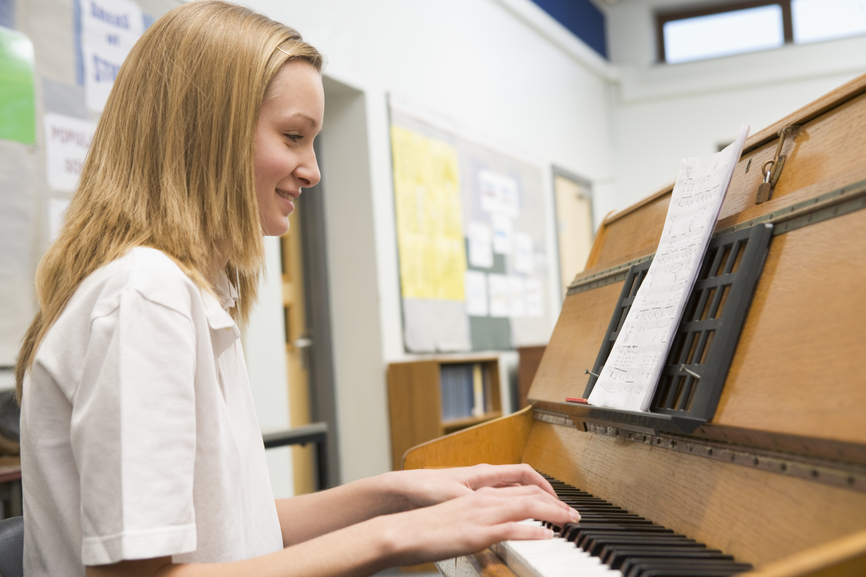Several of our instrumental teachers (who studied and graduated music at university) started learning their instrument when in their teens. As a great method of self-expression and to de-stress Music is the perfect answer for every teen!
How Music Can Improve Your Teen’s Self-Esteem
Nurturing your teen’s self-esteem ought to be easy. Your child has so many wonderful qualities, and if she were to embrace them, perhaps she’d move closer to achieving her full potential.
Now, imagine a brain that is constantly seeking pleasure, being bombarded with sensory information, igniting impulses. All the while, adolescent fears of the unknown, a lack of self-understanding, and fears of inadequacy crowd in. It can be hard to get an encouraging word in before the headphones go back on, and your teen tunes out.
Self-esteem can be measured by how much we like ourselves. When a teen likes and respects her- or himself, he or she performs better and is happier in general. According to Brian Tracy, author of the bestselling book, The Psychology of Achievement, “The more you like yourself, the more confidence you have.” Tracy believes there are three key self-esteem builders: determining your values, striving for a sense of being in control of your life, and knowing your goals and objectives. How can music help teens accomplish these tasks?
Music helps determine your teen’s values.
When your teen is clear about what she believes in and values, she establishes a sense of self-respect. Self-respect leads to an unwillingness to compromise values. Popular song lyrics frequently wrestle with teen-targeted issues: sexual or emotional love relationships, finding oneself, coming of age, fitting in, and ruminations on what the future might hold. Sound like the themes of songs your teen’s listening to?
Music, particularly rock and roll, plays an important role in defining your child’s world. Generation after generation, rock music continues to revolutionize youth culture, language, attitudes, and fashion. It’s all about breaking boundaries, social rebellion, and exploring the primal and taboo developmental milestone questions, classically examined and sorted during adolescence. For teens, finding others who share an affinity for a band gives them a sense of belonging, of no longer being “alone.” Finding where they fit in helps them to better understand themselves.
Rock and roll has dominated the music scene for decades because rock music is particularly effective at helping teens gain self-awareness. But how?
Jukko Tervo, a Finnish music therapist, singer/songwriter, and author says, “The significance of rock music is essentially connected with the fact that the adolescent has neither words nor commonly shared ways of expressing the new and never before experienced changes taking place within him- or herself. Music can emotionally affect adolescents at a deeper level than is possible with words alone. Rock music can enable adolescents to express, to be in contact with, and to share amongst themselves feelings of anger, rage, grief, longing, and isolation, as well as to experience closeness.”
So teens are constantly in emotional flux, and rock music helps sort out feelings and milestone questions, while aiding the search for self-understanding. How does music help teens gain a sense of control?
Music helps teens gain control of their life and responsibilities.
According to Tracy, Everything your teen does to gain mastery of schoolwork, sports, or any activity posing a challenge – results in feelings of being more in control of his or her life. Understanding the challenge, and better yet, appreciating what is learned, causes children to feel more effective, capable, and powerful. These feelings motivate a willingness to take on more complicated challenges, or, “level up.”
Hannah Isbell, a sophomore at University of Seattle majoring in International Studies and French, recalls how playing cello in Middle Grade and High School orchestra set the course for gaining self-control and accepting responsibility, while achieving something greater than she could on her own: “Being a part of orchestra had a profound influence on my life. It’s a group effort. We must listen to each other to hear our cue to come in, or when to begin or finish the last drop of sound the audience will hear. It starts with the individual, and turns into the work of one’s section, which is part of the entire ensemble. There is so much precision and focus required. Orchestra taught me how to be patient with others, and most importantly, it has left me with an appreciation for the importance and beauty of the classical arts.”
Isbell touched on some key issues: seeing oneself as one part of a whole, and performing to one’s highest potential within the expectations of the group. Gaining control of one’s life and responsibilities doesn’t have to be a solo mission. Better self-esteem can be gained through teamwork.
“Music performance involves many cognitive, perceptual, and motor skills,” reports Dr. Mark Tramo, assistant professor of neurology at Harvard Medical School. “These skills can be transferred to different kinds of intellectual activities. Music also allows you to put a lot of emotion into what you play or sing.”
But what if your teen is fixated on a group dedicated to something less esteem-building than performing a piece of classical music?
How does music help teens determine goals and objectives?
The more your child’s goals and activities are consistent with his or her values, the better he or she will feel. When your teen’s working at something she believes in, something compatible with her natural talents and abilities, she’ll like herself more. When one student seems more talented or successful than another, what they’ve accomplished, generally, has more to do with goal-setting than intellect. We can look at goal-setting as planning the steps toward solving a problem.
